Coronado, CA 92178
Newsletter 2015 December
Word of the Month: Giving
From the verb to give:
1. freely transfer the possession of an object to another
2. grant (permission, opportunity, etc.) to someone
3. impart, bestow or communicate
4. yield to pressure
note: When a verb changes into a noun by adding “-ing” to the end, it is called a gerund. You can spot a gerund in a sentence as the subject, a direct object, an indirect object, or an object of a prepositional phrase. But adding “-ing” to a verb can also create a present participle. A present participle completes a progressive verb (an action still in progress) as well as acts as a modifier (describes, defines, limits, or modifies a verb or noun).
Can you spot the difference in these sample sentences?
Feeling gratitude and not expressing it is like wrapping a present and not giving it.

It’s not how much we give but how much love we put into giving.
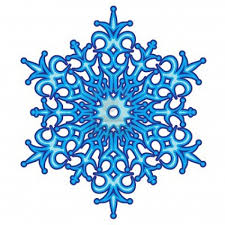
Remember that the happiest people are not those getting more, but those giving more.

Kindness in words creates confidence. Kindness in thinking creates profoundness. Kindness in giving creates love.

It is the heart that does the giving; the fingers only let go.

Our greatest weakness lies in giving up. The most certain way to succeed is always to try just one more time.
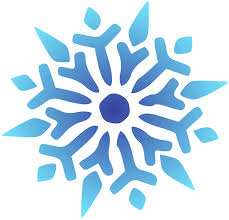
A Dictionary Makes a Great Christmas Present
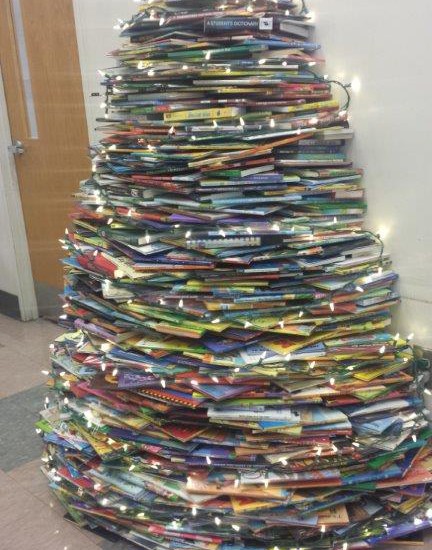
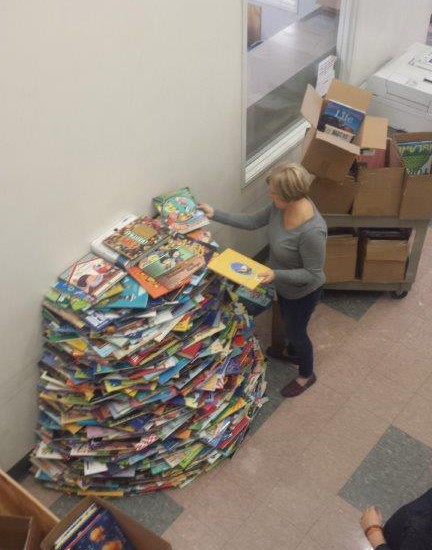
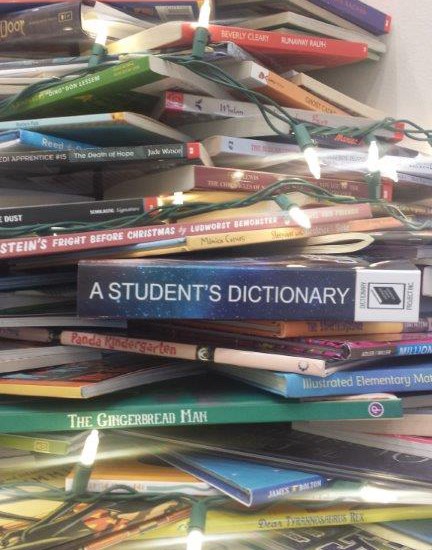
The LeGrange Housing Authority, GA
The LaGrange Housing Authority is committed to adding value to lives of their residents. They believe that knowledge is power and reading is a fundamental skill. “We are very aware that kids love toys and gifts during the holiday season, but we felt it is necessary to empower our kids with knowledge,” said Zsa Zsa Heard, CEO.
“We decided that instead of toys we would give every household a dictionary,” she said. In addition, every child will also receive an age appropriate book to increase their reading skills and encourage them to continue to read. The Housing Authority believes the commitment to provide a book is a gift that lasts forever. “The value can never be measured,” said Heard, “because reading is a lifetime of learning.”
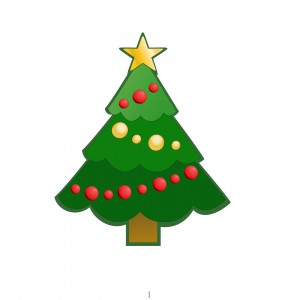
Please enjoy this Christmas video submitted by one of our sponsors, Donald French.
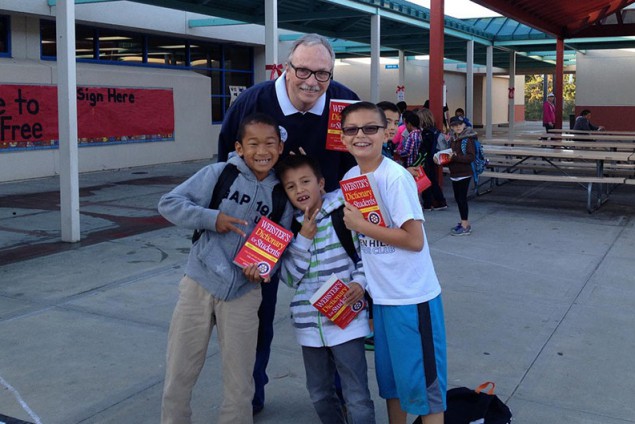
The Rotary Club of Laguna Niguel, CA handed out more than 600 dictionaries this year to students in Orange County. By giving the gift of a personal dictionary, members aim to promote literacy and inspire students to build their vocabulary. Rotarian William Nguyen, DDS, also gives dictionaries to his patients for Christmas, ensuring big smiles for everyone.

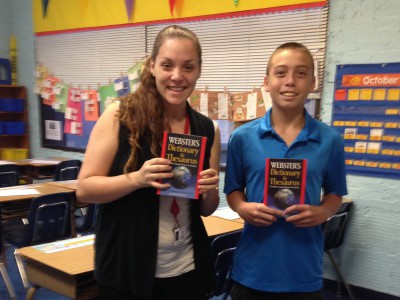
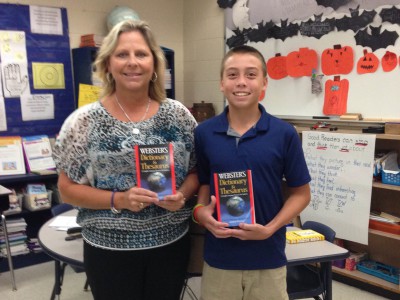
Matthew’s project shows us the how one individual – regardless of age or resources – can make a lasting impression on future generations. His efforts are commendable and his thoughtfulness, inspiring.
Children Helping Children
The Dictionary Project works with countless sponsors across the county, from businesses to civic organization, from all walks of life, and all ages. It is especially exciting when we see younger individuals start a project to promote and encourage third grade students. One young man from the state of Florida, Matthew, decided he wanted to raise money and donate dictionaries to two local elementary schools in Orlando this year. After completing his project at Theodore Roosevelt and Eola Elementary Schools, he sent us an essay to explain why he became involved in the project and how he was able to raise money for the books:
My Dictionary Project is to help third graders have access to dictionaries and my goal is to raise funds and donate them. I believe that it is important for all kids to have dictionaries available to them because every kid should have the opportunity to be able to access and use one as a tool for learning like the more fortunate kids in other schools. I am donating to three third grade classes -Theodore Elementary in Cocoa Beach, Passport Charter School and Lake Eola Charter School, both in Orlando. I have raised $240 and spent 20 hours.
I raised the money in a couple of different ways. Some of my hours were spent organizing a charity football pool. I spent my time planning it, making the PowerPoint for it and managing it. I reached out to my family and friends and organized the pool and communicated and collected the funds. The second way I raised money was by washing cars. I spent several hours washing neighbors’, friends’ and families’ cars. The last way I raised the money for the dictionaries was by selling bracelets. The bracelets have blue ribbons on them to symbolize education awareness. I did this because I believe that everyone should know that not all kids have all the tools they need for a better education. Also I know that all kids deserve to have everything they need for a successful education.
I was very excited and it felt great donating the dictionaries to the kids and teachers. When I donated the dictionaries to the 3rd grade classes it was so great to see their faces light up knowing that they would be receiving their own dictionary. After I donated to the Lake Eola Charter School all of the students sent me clever and thank you cards they made themselves. That gesture made me very happy. Here are some of the comments from the teachers we reached out to:
We are thrilled! We use only two dictionaries and two thesaurus and it is difficult! We are so grateful!

Wow! Thank you so much. I would greatly appreciate that. My students and I would love to have that donation. Thank you for picking our class out of so many schools and classrooms to choose from. He will be making such a difference for us.
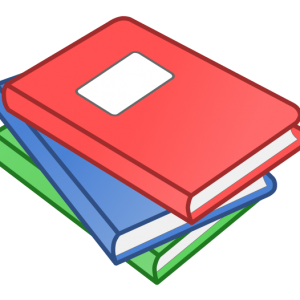
My class would be delighted to have these resources! We write in class every day and have been focusing on the importance of using resources such as these to make your reading and writing better.

The Rotary Club of Philadelphia's "Signature Project"
Excerpt from the Philadelphia Rotary Bulletin (December, 2015):
One of our nation’s most famous demographers has described the impact of the USA’s persistent very high rate of inequality among children as dependent on “The Accident of Birth.” Being born into poverty—certainly not always… but all too often — sets the stage for failure in life. A recent research study noted dramatic differences between children born into poverty and children born into the middle and upper classes. Between birth and five years of age, the children of the middle and upper classes will have heard 30 million more words spoken to them than the child of poverty parents. This sets the stage for tremendous challenges teachers encounter, including the disparity in skill level of incoming students and how to effectively teach those who are struggling or behind.
“Tragically, children from inner city schools who often have the greatest academic needs often receive the least educationally when compared to their suburban neighbors,” said Rotarian Joseph Batory. Wanting to invest in the academic success of these children, Batory introduced The Dictionary Project to Philadelphia Rotarians in 2006. Since then, over 16,000 books have been donated to students in the greater Philadelphia area. This year, project coordinator Matthew Tae helped organize the distribution of over 1,000 books to 20 local schools. The Philadelphia Rotary Club’s dedication and support has helped insure that all students, regardless of social status or family background, receive the benefits of owning a personal dictionary.
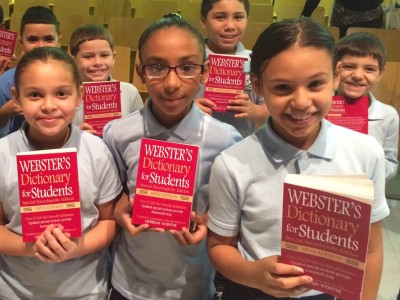
Our gifts of books (dictionaries, atlases, thesauruses and library books) and onsite motivational visits to four schools by club members this past fall helped to bridge that gap. Each gift became the property of the child and can be used for many years in their school experiences. Congratulations to Philadelphia Rotary Literacy Chair Matt Tae for leading yet another terrific book distribution project.
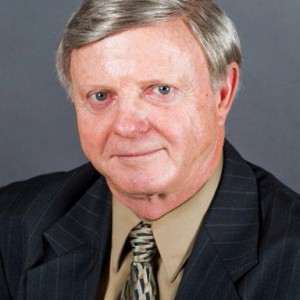
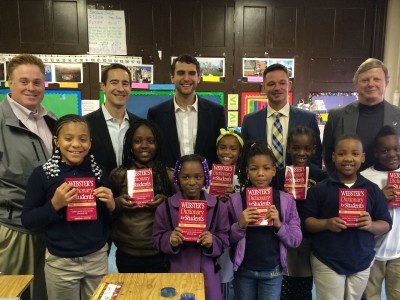
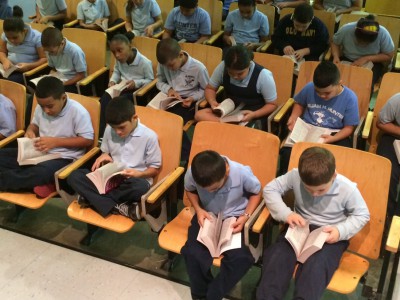
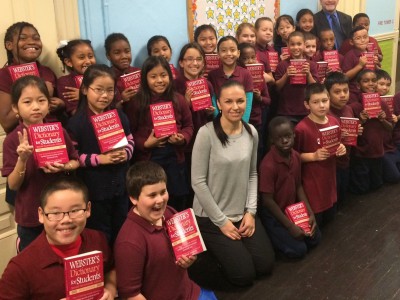
A Letter to the President of the United States
Dear President Obama,
Please send a birthday card to my friend Barbara Massey, who was born on December 14. I met Barbara in March 1995 after a school shooting. We sat next to each other at a meeting at Toole Middle School in Charleston, South Carolina, where a community had gathered together to find a way to help youth of Charleston focus on their future instead of hatred. Everyone in the room wanted ot find a way to avoid similar deaths and make our community a better place.
You could not find two people who were more different. Barbara is black and I am white and young enough to be her daughter. I had recently moved to Charleston from New York City. She was born and raised in New Orleans and lived in Charleston for more than 30 years. Barbara was a teacher at A.C. Brown High School in Charleston with Congressman James Clyburn.
At the time, South Carolina was ranked 47th in the nation in education. We believed that often, people are involved in shootings because they are frustrated and they do not have the words to properly express themselves. Together, we started a nonprofit organization called The Dictionary Project, with an original goal of giving a dictionary to every third grade student in Charleston. She told me if you raise the money, I will visit the schools and give the dictionaries to the children. We created the Dictionary Project as a safety net to help improve the education of our students. All third grade student attending public school in South Carolina now receive a personal dictionary and South Carolina is ranked 42nd in the nation.
We are still trying to ensure that the students in the Corridor of Shame in South Carolina will be able to receive a minimally adequate education! I have enclosed a recent article showing that progress is not as quick and easy as we would like to see. It is still hampered by racism, yet we all agree that education is the only equalizer. Ignorance only serves to divide us; education will bring people together.
Strangely if that shooting had not occurred, The Dictionary Project would not have started. Barbara and I met 20 years ago due to tragic circumstances. Although we were very different, our goal was the same, to find a way to change the way people see each other – with love and compassion, not hate and anger. Nearly 26,000,000 students all over the United States and the world have received a dictionary since we met. Every tragedy shows us that we are surrounded by love. People really do want to help each other, giving is a reflex action, its helps us grow.
Sincerely,
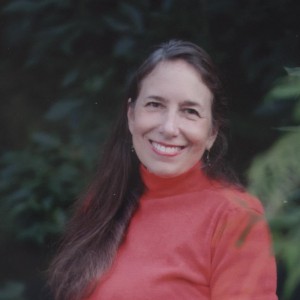
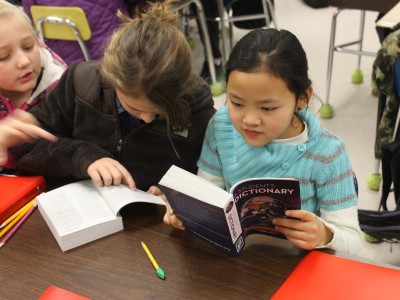
Thank You to Our Retiring Directors
Barbara Massey has served on the Board of Directors for the past 20 years . Her diligence and guidance has helped the program expand into all fifty state and we thank her for the kindness and generosity she has shared with us since she started The Dictionary Project.

The Dictionary Project would also like to thank Clint Schroeder for his four years of service on the Board of Directors. His expertise and insight has been an asset to the organization and our mission.

3 Tips to Promote Academic Success in Your Community
My daughter and I just wanted to say thank you for the dictionaries that your group gave to my daughter’s class at Green Mountain Elementary. She feels very grown up having her own dictionary at school. Much appreciated!

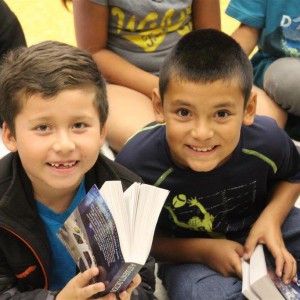
Dear Ms. French,
Thank you for my new dictionary. The dictionary helps me find words that make my stories interesting. It’s helpful many different ways.
Sincerely,

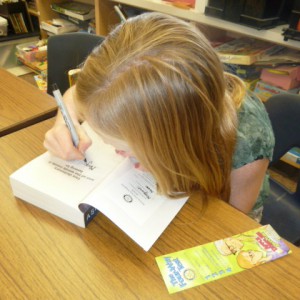
Dear Ms. French,
Thank you for my new dictionary. My dictionary is so useful to me. I can use it when I don’t know how to spell words. It is not just a book to me. I am very thankful that you chose to give it to me. My dictionary is the best gift ever!
Sincerely,

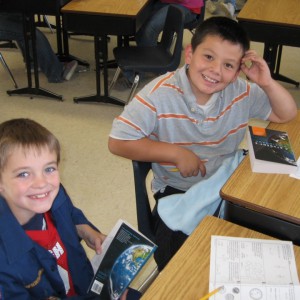
Dear Dictionary Project,
Thank you for the dictionary. It helps me a lot. When I’m writing I can pull it out of my desk. I only need it for big words. So that’s all I have to say. Thank you for everything.
Your friend,

1. Support
1. to bear all or part of the weight of; hold up
2. to give assistance to, especially financially; enable to function or act
Over the past 20 years, Dictionary Project supporters have donated more than 26 million dictionaries and contributed countless volunteer hours to ensure more students will be able to enjoy the benefits of owning a dictionary – Proof that when people collaborate, great things can be accomplished.
There are many ways our sponsors support students through their education. Some individuals have the time to volunteer, while others have the financial resources to contribute – both equally important and appreciated.
By funding a dictionary project and volunteering their time to personally present the books to students, members of the Lakewood Elks Lodge #1777 have supported local students for over 10 years. Faculty, parents and students have expressed their appreciation and gratitude to Elk member Venita Collier in letters below:
Principal, Saints Peter and Paul Catholic School
Dear Venita Collier and Members of the Benevolent and Protective Order of Elks Lodge #1777,
Our third graders are over joyed with the gift of the new dictionaries. In the younger grades we encourage students to write phonetically in order for them to grow in the fluency of thought. By third grade, however, instruction changes and the students understand that they now have the ability to look up the words they are not familiar with and/or do not know how to spell. As mentioned in your letter we, too, desire our students to be good writers, active readers, creative thinkers, and resourceful learners. The gift of the dictionaries is a terrific resource to aid in this development.
Please know of our gratitude for the gift of dictionaries not only for the gift this year, but for the past six years as well. May God bless you and all the Members of the Order of Elks.
In the Heart of Christ,
Sister Mary Patrice, Principal
Parent, Dennison Elementary School
Hello Venita,
Today our daughter was a recipient of one of the dictionaries from this project. I wanted to reach out and tell you how much we are touched by this gift. Already in one night have we expanded our vocabulary and been saying “look it up.” She is so excited to use the book and has been copying down the longest word in the book…forgive me if I don’t write that out! I certainly feel this book will enhance my daughter’s education, like no other. So, thank you for all the time, effort and devotion you and others have put into The Dictionary Project.
Sincerely,
Connie Muller
Parent, Saints Peter and Paul Catholic School
Good morning Ms. Collier,
I am a parent of two children who have the blessing of attending Saint Peter and Paul Catholic School.
This weekend, my son Sergio brought home his very own dictionary that your organization, the Lakewood Elks #1777, donated to him and the rest of his classmates. I would like to express my sincere appreciation and gratitude for your generosity which is going to allow Sergio to expand his vocabulary and understanding.
This truly makes a big difference at a young age. I wanted you to know that your kindness is not overlooked and as a parent, means the world to us as a family. God bless you and please extend our thanks to all those involved.
Sincerely,
Jennie Marquez
Third Grader, Hutchinson Elementary School
Dear Lakewood Elks,
My name is McKinley and I am in third grade. I go to Hutchinson Elementary. A few weeks ago I got my own dictionary from you. I just wanted to say thank you and I really appreciate it. I think the dictionary will give me new words and make me a better writer. Thank you again.
Sincerely,
McKinley
P.S. I used my dictionary to spell these words
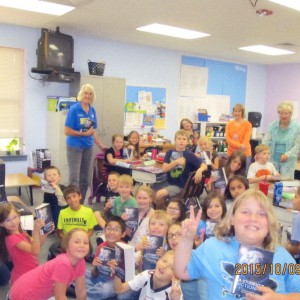
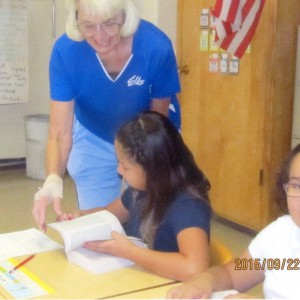
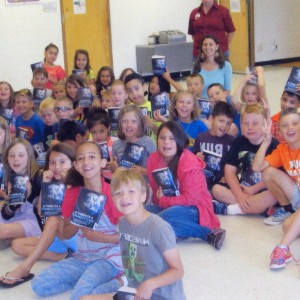
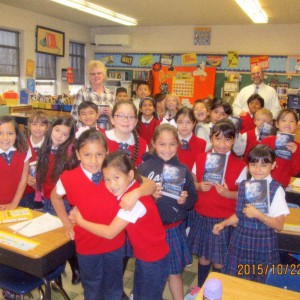
2. Interact
in·ter·act /ˌin(t)ərˈakt/, verb:
1. to talk or do things with other people
2. to act together: to come together and have an effect on each other
The opportunity for social interaction is very important for the development of a child’s interpersonal skills, including self-awareness, the ability to problem solve and effectively communicate. Children who learn appropriate social skills often have a higher self-esteem and show a greater willingness to interact with their environment as they grow older.
We believe that when sponsors, like the Rotary Club of Corinth, personally visit a classroom to present dictionaries, their interaction with students makes a lasting impression. Since 2007 members of the Rotary Club of Corinth, NY have participated in The Dictionary Project in order to promote educational development and interpersonal skills. At the beginning of each presentation, Corinth Rotarian Alysse Kasowski introduces the Rotary 4-Way Test:
In all we think, say or do, consider:
Is it the TRUTH?
Is it FAIR to all concerned?
Will it build GOODWILL and BETTER friendships?
Will it be BENEFICIAL to all concerned?
By definition, if people interact with each other, they will have an effect on each other. Thus, it is important to think about what kind of effect you have on someone or something – the underlying inquiry of the 4-Way test. Kasowski tells students that truth, fairness, and goodwill are beneficial to all mankind and just as important to a 3rd grader as it is to a Rotarian. She shares with students the importance of being a good citizen and encourages them to volunteer everyday to make the world a better place. One student responded by saying, “What if you run out of a job though?” Kasowski chuckled and responded by saying, “That’s the beauty of doing good, you can never do enough.”
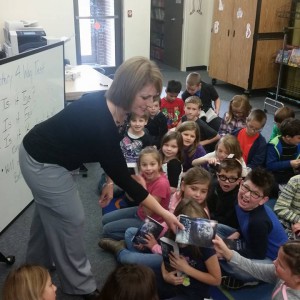
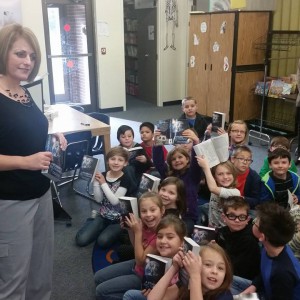
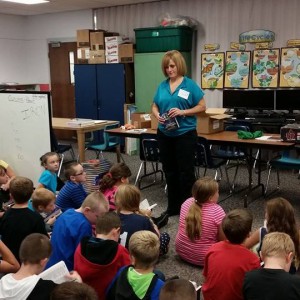
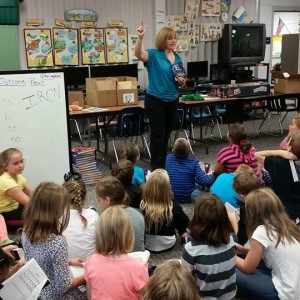
3. Encourage
en·cour·age/inˈkərij/, verb:
1. to make (someone) more determined, hopeful, or confident
2. to make (something) more appealing or more likely to happen
Encouragement is a powerful tool. It gives us the opportunity to point out a person’s potential and challenge them to succeed at a specific goal. But encouragement does not have to be amplified cheers in an arena to leave a profound impression. It is often the subtle, simple gestures that lift the spirit and build confidence the most.
For students who are leaning how to formulate, read, and write words, encouragement is monumental to advancing their academic growth. Research on educational development has revealed that learning is how a child feels about learning. Students who struggle to read are more likely to develop negative attitudes toward reading and avoid reading altogether. That is why positive reinforcement from teachers, parents, and sponsors like you is so important to inspire life-long readers. Children need to know that adults in their lives care about reading and sponsors like Anthony and Sarah Triola are making this happen.
Valuing the importance of education, Anthony and Sarah Triola picked up the project in Killeen Independent School District, Texas. Not only do the Triolas encourage third graders to read and write, they also encourage individuals, businesses, and local civic organizations in their community to participate by sponsoring a third grade class, visiting schools and helping hand out dictionaries.
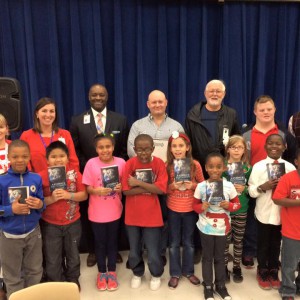
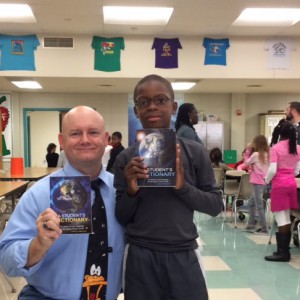
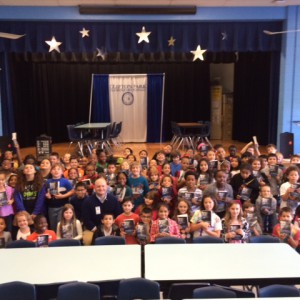
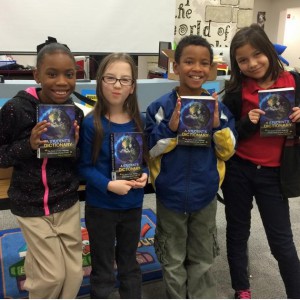
December Sponsor Spotlights
| Monday | Tuesday | Wednesday | Thursday | Friday | Saturday | Sunday |
|---|---|---|---|---|---|---|
| 30 Leelanau County Republican Women, MI |
1 Orleans-Eastham Elks #2572, MA |
2 Hastings Kiwanis, MI |
3 Hawk Point Lions, MO |
4 Virginia Rotary, VA Elizabethtown Rotary, NC |
5 | 6 |
| 7 Marcellus Grange #464, NY |
8 Grants Fire & Rescue, NM Delaware Rotary, OH |
9 Millville Elks #580, NJ Oskaloosa Elks #340, IA |
10 Monroe Rotary, MI LaGrange Sunrise Rotary, NY Huron Rotary, OH |
11 Ferry County Granges, WA Winona Rotary, MN |
12 | 13 |
| 14 Everest Area Optimist, WI |
15 Lahaina Sunset Rotary, HI Douglas Rotary, AZ |
16 Mountainside Rotary, NJ Watertown Elks #496, NY |
17 Moraine Rotary, OH |
18 Lake City Lions, IN |
19 | 20 |
| 21 Woman’s Club of Somersworth, NH |
22 Linda & Brent Keetch, CA Altrusa Club Of Lexington, KY Westmoreland Ruritan Club, VA |
23 Leaf River Grange #1812, IL |
24 Lee County CLCP, GA Forks Elks #2524, WA |
25 Merry Christmas! |
26 | 27 |
| 28 | 29 | 30 | 31 | 1 | 2 | 3 |
